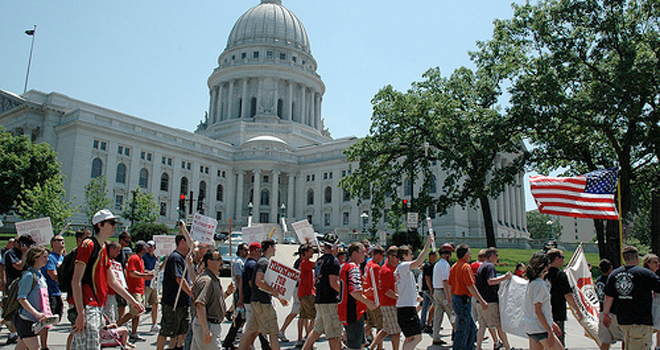Wisconsin GOP leaders are gearing up to pass the state’s controversial anti-union law again, after it was struck down in court thanks to the way it was passed. Or to be exact, they are now declaring that could pass it in the state budget process beginning Tuesday — if the state Supreme Court doesn’t rule in their favor and restore the law first.
If such a vote were taken, it would likely have two main effects: 1) Shutting off the current litigation that has revolved around the procedural manner under which the law was passed the first time; and 2) Provide a new political kickoff for the wave of state Senate recalls throughout the state.
The Wisconsin State Journal reports:
“If need be, we are going to have to pass collective bargaining again because it is such an integral part of not having those services slashed and those people laid off,” Assembly Speaker Jeff Fitzgerald, R-Horicon, said of the provisions, currently held up in court.
Fitzgerald said he expects the state Assembly to take up the two-year budget plan in an extraordinary session and may add collective bargaining as a floor amendment as soon as Tuesday afternoon.
He said lawmakers would only do so if the Wisconsin Supreme Court does not act by Tuesday afternoon. The court last week heard oral arguments on whether a legislative conference committee violated the state’s open meetings law when it rushed passage of the provision in March.
“I’m an optimist. I still think they might rule yet,” Fitzgerald said. “They still have some time,”
To be clear, Republicans have always had the option of re-passing the law, but have resisted doing so. In recent weeks, however, Gov. Scott Walker and legislative Republicans have begun to talk up the idea, as the court actions dragged on.
The legal matter revolves around a key conference committee used to advance the bill — and to get around the state Senate Dems’ walkout from the state — and whether it violated the state’s Open-Meetings law by failing to give proper 24-hours notice. Therefore, it is a ruling on procedural grounds, rather than on the substance of the bill itself.
In late May Dane County (Madison) Judge Maryann Sumi — who had previously blocked Wisconsin’s controversial anti-union law from taking effect, pending litigation — officially ruled that the manner in which the bill was passed violated the state’s Open Meetings law, and that the law itself is therefore not valid.
In mid-March, Sumi blocked the law on these procedural grounds, issuing a temporary restraining order on the grounds the plaintiff, the Dane County District Attorney Ismael Ozanne (D), had a likelihood of success in his complaint.
The Walker administration then made multiple attempts to disregard the ruling and implement the law anyway, before ultimately backing down in the face of repeated orders.






